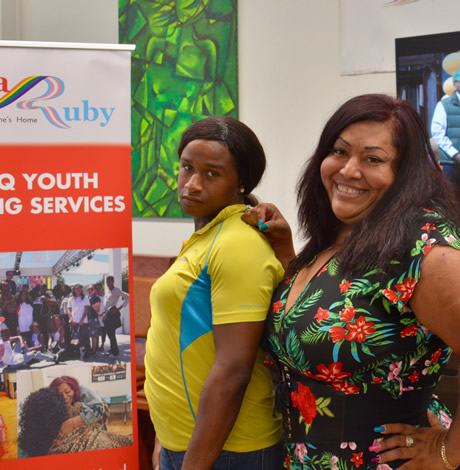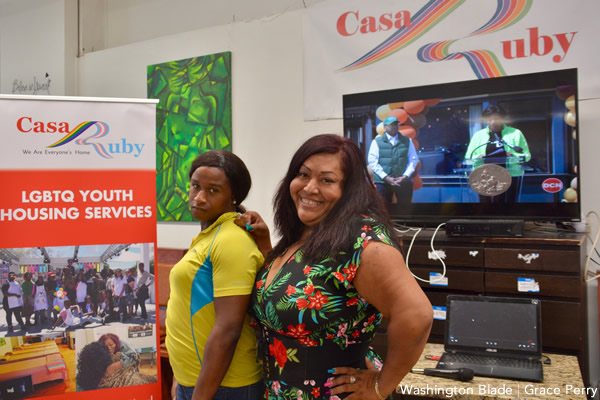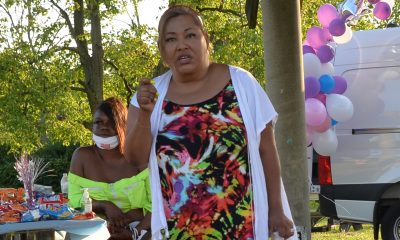Arts & Entertainment
SPOTLIGHTING LGBT HOMELESSNESS: Casa Ruby offers short- and long-term housing
Founder is trans immigrant and former homeless person

This story is part of our contribution to the 2018 #DCHomelessCrisis news blitz. Local media outlets will be reporting and discussing stories about ending homelessness in the nation’s capital all day. The collaborative body of work is cataloged at dchomelesscrisis.press.
During the early 1990s, Ruby Corado spent most nights in public parks throughout D.C., trying to meet the basic needs of the homeless LGBT youth who had no safe space to go after 5 p.m. when the HIV clinics closed.
And so the movement began.
Now, 26 years later, Corado is the director of Casa Ruby, a local bilingual and multicultural organization founded in 2012 that provides housing and social services to LGBT individuals 24 hours a day.
The transgender El Salvador native says Casa Ruby started as an “emergency room.”
“We were taking care of very sick people that were disposed (of) by society and that were barely holding on,” she says.
While the organization continues to do emergency work when necessary, its primary focus is now on preventative work and long-term planning and personal development.
“Our goal is to have someone come to Casa Ruby and three years down the line, they will no longer be homeless,” Corado says.
Casa Ruby can accommodate up to 100 individuals across its four housing programs: hypothermia or low barrier, short-term, transitional and permanent. Residents in every program receive three meals a day, meaning Casa Ruby prepares and delivers 4,000 meals every month.
Open 24 hours a day, 365 days a year, the hypothermia or low barrier program offers anyone in need a place to rest with no commitment or age restrictions. At least one case manager is on site at all times. Corado estimates that Casa Ruby has housed 9,600 people in this program over the past six months alone.
“We never close,” Corado says. “Our doors are always open.”
Stephanie Carey, a current resident at Casa Ruby since February, sees the organization as the oasis Ruby intended. The 29-year-old Maryland native recently moved to D.C. to join the Casa Ruby community.
“I had been kind of ostracized by my family. I come from a very Evangelical, southern, conservative family,” Carey says, who identifies as pansexual and outside the gender binary. “I was going through some hard times and I Googled LGBT shelters and Casa Ruby was the first one that popped up.”
All three of the other housing programs are reserved for LGBT youth ages 18-24. The short-term program provides these clients stable housing and support services for three-six months and aims to help them transition to more permanent housing. Transitional housing is similar to short term, but clients may stay up to 18 months. Also, it requires that residents complete 35 hours of “personal improvement” each week. These hours may be completed any number of ways, including through school or an employment service.
Permanent housing is designed for residents who have stable jobs but are unable to secure long-term housing.
“Landlords never really saw them as ideal renters” because “they were either too gay, too black, or too big or something,” Corado says. These residents work and pay rent for these houses owned by Casa Ruby.
The only eligibility requirement might surprise you.
“When you come to Casa Ruby, you don’t have to be willing to give love to other people, but you have to be willing to accept it, and it begins with that,” Corado says.
Around 215 youth have gone through short-term, transitional and permanent housing since 2012. Despite currently having 100 beds, Casa Ruby still has a 100-person waitlist for its programs, which it’s hoping to eliminate with more funding and resources.
In 2017, Casa Ruby’s annual operating budget was $1.7 million and Corado projects 2018’s will be around $2.1 million. Approximately half of the budget comes from government support and the other half comes from individual donations and grants from foundations.
“We have thousands of one-dollar donations,” Corado says. “Which is great because I think it stays true to the mission of being grassroots.”
Even though her advocacy and activism has changed and evolved over the past few decades, Corado says her role has fundamentally stayed the same: “My job as the founder and director today still is to make sure that we restore dignity to people that have been denied their dignity for so long.”
For Carey, Casa Ruby serves a multitude of purposes from simply “a place to rest your head” to a space “to be around people you identify with. … Casa Ruby is everybody’s home.”
a&e features
Eastern Shore chef named James Beard Finalist
Harley Peet creates inventive food in an inclusive space

In a small Eastern Shore town filled with boutiques, galleries, and the occasional cry of waterfowl from the Chesapeake, Chef Harley Peet is most at home. In his Viennese-inflected, Maryland-sourced fine-dining destination Bas Rouge, Peet draws from his Northern Michigan upbringing, Culinary Institute of America education, and identity as a gay man, for inspiration.
And recently, Peet was named a James Beard Finalist for Best Chef: Mid-Atlantic – the first “Best Chef: Mid-Atlantic” finalist representing the Eastern Shore.
Peet, after graduation from the Culinary Institute of America, took a position as sous chef at Tilghman Island Inn, not far from Bas Rouge. Falling in love with the Eastern Shore, he continued his passion for racing sailboats, boating, gardening, and fishing, and living his somewhat pastoral life as he opened Bas Rouge in 2016 as head chef, a restaurant part of the Bluepoint Hospitality group, which runs more than a dozen concepts in and around Easton, Md.
Coming from a rural area and being gay, Peet knew he had his work cut out for him. He was always aware that the service and hospitality industry “can be down and dirty and rough.”
Now as a leader in the kitchen, he aims to “set a good example, and treat people how I want to be treated. I also want to make sure if you’re at our establishment, I’m the first to stand up and say something.”
The Bas Rouge cuisine, he says, is Contemporary European. “I’m inspired by old-world techniques of countries like Austria, Germany, and France, but I love putting a new spin on classic dishes and finding innovative ways to incorporate the bounty of local Chesapeake ingredients.”
His proudest dish: the humble-yet-elevated Wiener Schnitzel. “It is authentic to what one would expect to find in Vienna, down to the Lingonberries.” From his in-house bakery, Peet dries and grinds the housemade Kaiser-Semmel bread to use as the breadcrumbs.
Peet works to support the LGBTQ community inside and outside of the kitchen. “I love that our Bluepoint Hospitality team has created welcoming spaces where our patrons feel comfortable dining at each of our establishments. Our staff have a genuine respect for one another and work together free of judgment.”
Representing Bluepoint, Peet has participated in events like Chefs for Equality with the Human Rights Campaign, advocating for LGBTQ rights.
At Bas Rouge, Peet brings together his passion for inclusion steeped in a sustainability ethic. He sees environmental stewardship as a way of life. Peet and his husband have lived and worked on their own organic farm for several years. Through research in Europe, he learned about international marine sourcing. Witnessing the impacts of overfishing, Peet considers his own role in promoting eco-friendly practices at Bas Rouge. To that end, he ensures responsible sourcing commitments through his purveyors, relationships that have helped create significant change in how people dine in Easton.
“I have built great relationships in the community and there’s nothing better than one of our long-standing purveyors stopping in with a cooler of fresh fish from the Chesapeake Bay. This goes especially for catching and plating the invasive blue catfish species, which helps control the species’ threat to the local ecosystem.
Through his kitchen exploits, Peet expressed a unique connection to another gay icon in a rural fine-dining restaurant: Patrick O’Connell, of three Michelin starred Inn at Little Washington. In fact, Peet’s husband helped design some of O’Connell’s kitchen spaces. They’ve both been able to navigate treacherous restaurant-industry waters, and have come out triumphant and celebrated. Of O’Connell, Peet says that he “sees [his restaurants] as canvas, all artistry, he sees this as every night is a show.” But at the same time, his “judgment-free space makes him a role model.”
Being in Easton itself is not without challenges. Sourcing is a challenge, having to either fly or ship in ingredients, whereas urban restaurants have the benefit of trucking, he says. The small town “is romantic and charming,” but logistics are difficult – one of the reasons that Peet ensures his team is diverse, building in different viewpoints, and also “making things a hell of a lot more fun.”
Reflecting on challenges and finding (and creating) space on the Eastern Shore, Peet confirmed how important it was to surround himself with people who set a good example, and “if you don’t like the way something is going, fuck them and move on.”

Team DC, the umbrella organization for LGBTQ-friendly sports teams and leagues in the D.C. area, held its annual Night of Champions Awards Gala on Saturday, April 20 at the Hilton National Mall. The organization gave out scholarships to area LGBTQ student athletes as well as awards to the Different Drummers, Kelly Laczko of Duplex Diner, Stacy Smith of the Edmund Burke School, Bryan Frank of Triout, JC Adams of DCG Basketball and the DC Gay Flag Football League.
(Washington Blade photos by Michael Key)




















The 2024 National Cannabis Festival was held at the Fields at RFK Stadium on April 19-20.
(Washington Blade photos by Michael Key)
















Covering the @NatlCannaFest at RFK Stadium for @WashBlade . Stop by the LGBTQ+ booth and pick up a paper if you are here. pic.twitter.com/is7hnsaPns
— Michael Patrick Key (@MichaelKeyWB) April 20, 2024
-

 State Department2 days ago
State Department2 days agoState Department releases annual human rights report
-

 Maryland4 days ago
Maryland4 days agoJoe Vogel campaign holds ‘Big Gay Canvass Kickoff’
-

 Autos5 days ago
Autos5 days agoSport haulers: Jeep Grand Cherokee, Mercedes GLE-Class
-

 Politics3 days ago
Politics3 days agoSmithsonian staff concerned about future of LGBTQ programming amid GOP scrutiny











